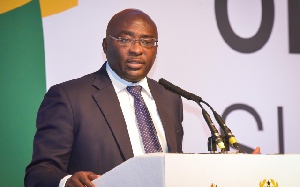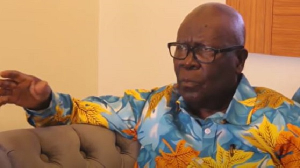Vice President Dr Mahamudu Bawumia on Thursday announced that 79 projects under the One-District, One Factory (1D1F) Initiative, which are at different stages of implementation, would be rolled out by the end of this year.
He said additional 35 projects were undergoing credit appraisal to ensure they received financial support for smooth take-off.
Vice President Bawumia announced this at the opening of the Second Stakeholders’ Conference on Economic Diplomacy, in Accra.
The Vice President said the Nana Akufo-Addo’s government overriding strategic objective was for a “Ghana beyond Aid” and that the nation could not attain that objective with wishful thinking, but with strong policies on the ground to realise it.
He said the Government had created a conducive macro-economic environment for potential investors to leverage on for smooth take-off, in order to propel the country’s industrialization agenda.
The three-day event on the theme: ” Leveraging Economic Diplomacy for Ghana’s Industrialisation Agenda”, attracted Ghana’s Diplomatic Missions, the Diplomatic Community, Ministers of State, policy-makers and captains of industries.
The conference, organised by the Ministry of Foreign Affairs and Regional Integration and United Nations Economic Commission for Africa (UNECA), provided the platform for stakeholders to share information, deepen understanding on government policies and proffer workable solutions to the country’s economic challenges aimed at achieving the industrialisation agenda.
The dialogue would focus on the strategies for the promotion of made-in-Ghana goods and services, the 10-point strategies on industrialization developed by the Ministry of Trade and Industry as well as to strategise on how Ghana could position herself to benefit from the African Continental Free Trade Area (AfCFTA) Agreement and attract Direct Foreign Investments.
Vice President Bawumia said there was an urgent need to focus on attracting trade and investments into the national economy, saying that government had launched the Planting for Food and Jobs and operationalised the Ghana Commodity Exchange to promote private sector investment in industry and agriculture sectors, which would contribute to the transformation of the economy.
To attract the desired investments into the economy, he said, it was prudent to create macro-economic stability and a suitable business environment that would make the nation competitive on the global market.
In that regard, he said, upon assumption of office, the Government, through prudent economic policies, stabilised the macroeconomy, increased economic growth from 3.7 per cent in 2016 to 8.5 at the end of 2017, agriculture growth moved upwards from three per cent to 8.4 in 2017, industry growth went up from a negative five per cent to 16.7 per cent.
The Vice President noted that the fiscal deficit declined from 9.3 per cent in 2016 to 5.9 per cent in 2017; year-on-year inflation tumbled from 15.4 in 2016 and currently hovering at 9.5 percent, while the interest rate had been on the decline and the trade position with the rest of the world, which was at a deficit of $1.4 billion in 2016 improved to a surplus of one billion dollars in 2017.
In spite of those gains, he said, it was not sufficient to achieve the “Ghana Beyond Aid” objective, and advocated the need to do things differently to attain that vision.
In view of that, he said, the Government had taken deliberate efforts to formalize the economy by leveraging on technology to help propel the economy to a different level through digitization.
Some of those measures include the issuance of the National Identification Cards that would uniquely identify everybody in the country, National Digital Property Addressing System, Electronic Registration of Businesses, Paperless Ports System, National Emergency Number, Mobile Money Interoperability Payment System and e-Smart Driver and Vehicle Registration.
“These are the measures we’re undertaking to formalize the economy and propel the development of the country and give us the data that we require to move us forward as a nation,” Dr Bawumia stated.
Vice President Bawumia was of the view that those measures would ensure much more discipline in the management of the economy and made the nation competitive on global trade.
Business News of Thursday, 29 November 2018
Source: ghananewsagency.org

















